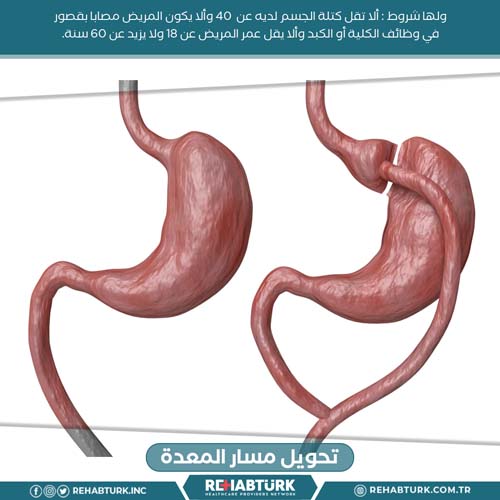Gastric bypass in Türkiye
Gastric bypass is a surgical procedure that helps you lose weight by changing the way your stomach and small intestine handles food. After the surgery, the stomach will become smaller and the person will feel full after eating fewer meals.
After this procedure, the food will not go into some of the parts of the stomach and small intestine that absorb it. Because of this, the body will not get all the calories from the food that is eaten.
What is the purpose of the conversion process ?
Weight loss surgery may be an option when you are severely obese and cannot lose weight through diet and exercise. To determine the possibility of getting the operation, doctors often use the presence of a certain limit of body mass index or the presence of certain health conditions such as type 2 diabetes and high blood pressure .
Gastric bypass surgery is not a quick fix for obesity. The lifestyle must be changed dramatically. Therefore, you should eat healthy foods after this surgery, control portions, and exercise. In the event that these instructions are not adhered to, there may be complications from surgery and poor weight loss.
This procedure may be recommended when there is:
- A body mass index of 40 or greater. A person with a BMI of 40 or greater is at least 100 pounds (45 kilograms) overweight. A normal BMI ranges between 18.5 and 25.
- A body mass index of 35 or greater and a serious medical condition that may improve with weight loss. Some of these conditions are obstructive sleep apnea, type 2 diabetes, and heart disease .
Steps of the gastric bypass operation

This operation is done under general anesthesia. Where the patient is asleep and does not feel any pain.
There are two steps during the gastric bypass procedure:
The first step is to make the stomach smaller. The surgeon uses staples to divide the stomach into a small upper section and a larger lower section. The upper part of the stomach (called the pouch) is where the food will go after you’ve eaten it.
The second step is the bypass. The surgeon connects a small part of the small intestine (the jejunum) to a small opening in the pouch. The food travels from the pouch to this new opening and into the small intestine. As a result, the body absorbs fewer calories.
Ways to perform the conversion process
Gastric bypass can also be performed in two ways.
With open surgery, the surgeon makes a large incision to open the abdomen. The operation is performed by operating on the stomach, small intestine and other organs.
By laparoscopy using a small camera called a laparoscope. The camera is inserted into the abdomen. This surgery is called laparoscopy. Where the endoscope allows the surgeon to see inside the abdomen.
In this surgery:
- The surgeon makes 4 to 6 small incisions in the abdomen.
- The scope and tools needed to perform the surgery are inserted through these openings.
- The camera is connected to a video monitor in the operating room. This allows the surgeon to see inside the abdomen while performing the operation.
The laparoscopic method is superior to open surgery in that:
- Shorter hospital stay and faster recovery.
- Less pain.
- Smaller scars and a lower risk of a hernia or infection.
- This surgery takes about 2 to 4 hours.
Operation risks
Gastric bypass is a major surgery and has many risks. Some of these risks are very serious. So you should discuss these risks with your doctor.
Risks of anesthesia and surgery in general include:
- Allergic reactions to medications
- Breathing problems
- Bleeding, blood clots, infection
- heart problems
Risks of gastric bypass include:
- Gastritis (inflammation of the lining of the stomach), heartburn, or stomach ulcers.
- Injury to the stomach, intestines, or other organs during surgery
- Fluid leakage from the suture site where the parts of the stomach were sewn together
- Malnutrition
- Scarring inside the abdomen can lead to bowel obstruction in the future
- Vomiting due to eating more than the capacity of the stomach bag.
before operationGastric bypass
The doctor will order several tests before performing this surgery, such as:
- Complete physical examination.
- Blood tests, an ultrasound of the gallbladder, and other tests to ensure good health.
- Visits to the doctor to make sure there are no other medical problems such as diabetes, high blood pressure, or heart or lung problems.
- Nutritional advice.
- Attend orientation classes to help you learn what happens during surgery, what you should expect afterwards, and the risks or problems that may occur afterward.
- The patient may wish to see a psychological counselor to ensure emotional readiness for surgeryGastric bypass. Because the ability to make major lifestyle changes after surgery is required.
You should also stop smoking several weeks before surgery and not start smoking again after surgery. Smoking slows recovery and increases problems.
Tell your surgeon or medical team:
- When there is a pregnancy or the intention to become pregnant in the future
- About medications, vitamins, herbs, and other nutritional supplements you’re taking, even those that don’t require a prescription
During the week before surgery Gastric bypass:
- You may be asked to stop taking blood-thinning medications. These include aspirin, ibuprofen (Advil, Motrin), warfarin (Coumadin), and others.
- You should ask the doctor about the medicines that you should take on the day of the surgery.
On the day of surgery:
- Follow your doctor’s instructions about when to stop eating and drinking.
- Medicines told by your doctor should be taken with a small sip of water.
- Get to the hospital on time.
after the procedure
Most people stay in the hospital for 1 to 4 days after surgery.
in the hospital:
- It is required to sit at the side of the bed and walk a bit on the same day as the surgery.
- A catheter (tube) may be inserted through the nose and into the stomach for a day or two. This tube helps drain fluid from the intestines.
- The bladder may also be catheterized to remove urine.
- The patient will not be able to eat for the first 1-3 days. After that, you can have liquids and then pureed or soft foods.
- There may be a tube attached to the largest part of your stomach that has been bypassed. The catheter is removed from the side and the fluid is drained.
- Special stockings are worn on the legs to help prevent blood clots from forming.
- The patient receives doses of medication to prevent blood clots.
- The patient is given pain relievers. In the form of pills to relieve pain or through an intravenous catheter inserted into a vein.
The patient can go home when:
- Being able to eat liquid or pureed food without vomiting.
- Move without much pain.
- No need for intravenous painkillers.
How does gastric bypass surgery treat type 2 diabetes?
With this surgery, doctors aim to help the small intestine of diabetic patients get rid of excess glucose.
Gastric bypass surgery often improves symptoms of type 2 diabetes, even before patients begin to lose weight.
why?
What we found, the doctors explained, is that the secret to treating diabetes after gastric bypass lies in the intestines.” “The key message is that after the bypass, the intestine becomes the most important tissue for glucose use and this reduces blood sugar levels.”
Doctors hope they can find a way to get the same results that lead to improvements for type 2 diabetics after gastric bypass without actually performing the surgery.
How can I book a gastric bypass operation in Türkiye?

- Free medical support on the phone: You will have a dedicated representative for your health condition who is always ready to answer your questions.
- Free consultation with a specialist doctor: Your medical representative will consult with a number of doctors and hospitals to find the best possible treatments.
- Free travel visa arrangement: We will contact the embassy in your country to assist you in obtaining a visa to visit Türkiye.
- Free itinerary planning: We will create a schedule for your medical trip to Türkiye.
- Free translation of documents and reports: We will translate medical documents and reports into Turkish on your behalf.
- Free support and monitoring: We will monitor the stages of treatment and be by your side every step of the way.
- Free instant translation: We will be with you during the treatment stages to provide translation between you and the medical team.
- Free accommodation and transportation coordination: We will book accommodation for you and your companions in Türkiye, along with transportation services.
Contact REHABTÜRK doctors for more information about the procedure and to evaluate your medical condition.

